About us
Scope of Roles
As the only statutory research center on Dokdo in the nation, the Dokdo Research Center implements comprehensive scientific surveys and research on a national level, utilizes the results and promotes the achievements, and supports national policy-making on Dokdo so as to ensure sustainable use of Dokdo and reinforce territorial sovereignty over the island.
In particular, with the expansion and reorganization into the KIOST East Sea Research Institute at Uljin-gun in Gyeongsangbuk-do, a location closest to Dokdo from the mainland, the Center is now established with more experts and facilities for Dokdo Research, in step with the Center’s increasing roles and responsibilities.
- Establishment and operation of the national statutory research center on Dokdo
- In accordance with the Act on the Sustainable Use of Dokdo, Dokdo Research Center, the only national statutory research center on Dokdo, was established in August 2007 to begin operations.
- Strengthening territorial sovereignty of Korea over Dokdo through publication and promotion of research outcomes on Dokdo
- The Center contributes to the reinforcement of Korea’s territorial sovereignty over Dokdo and sustainable use and management of Dokdo through publication and promotion of research achievements on a national and global level (Aiming to gain international recognition of the names ‘Dokdo’ and ‘East Sea’ and notations for indicating underwater geomorphologic features)
- Establishment and management of a comprehensive information system on Dokdo
- The Center provides accurate information on Dokdo based on scientific research and a comprehensive database.
- Comprehensive oceanographic research in preparation for sustainable future use of Dokdo
- In June 2006, “Research on Sustainable Use of Dokdo” started out of the five implementation strategies of the Master Plan for the Sustainable Use of Dokdo.
- The center acquires and collects comprehensive environmental and ecosystem data for Dokdo in preparation for the sustainable future use of Dokdo, such as identifying geomorphic/structural characteristics of Dokdo and the neighboring waters of Dokdo, and environmental monitoring such as ecosystem, seawater flow and circulation, and seawater characteristics
Background
- May 2005
-
Legislation of the Act on the Sustainable Use of Dokdo
Enactment of the Act to “contribute to the sustainable use of Dokdo and its neighboring waters by prescribing matters necessary for the protection of ecosystem and reasonable management and use of marine and fishery resources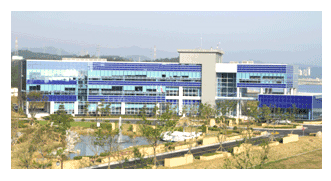
- May May
Establishment of Master Plan for the Sustainable Use of Dokdo
Establishment of the framework for policy-based implementation according to the purpose of the Act- August 2006
Launch of Dokdo Research Team
In accordance with the Act, a dedicated Dokdo Research Team is established within Korean Ocean Research and Development Institute (now KIOST) to conduct systematic and specialized research for the implementation of the Master Plan- August 2008
-
Reorganization of Dokdo Research Team into Dokdo Research Center
The Research Team is expanded and reorganized into the Dokdo Research Center with relocation to the East Sea Research Institute of Korean Ocean Research and Development Institute (now KIOST) in Uljin-gun, Gyeongsangbuk-do - July 2012
-
Launch of Korea Institute of Ocean Science and Technology (KIOST)
Change in the name of the organization from Korean Ocean Research and Development Institute to “Korea Institute of Ocean Science and Technology (KIOST)” - Present
-
Implementation and execution of projects in relation to the Research on Sustainable Use of Dokdo
Establishment of management framework and system for sustainable use of Dokdo through long/short-term monitoring of neighboring waters of Dokdo and comprehensive oceanographic research
Future Directions
1
- Promotion of more active Dokdo research in line with the launch of the KIOST East Sea Research Institute
- Expansion and reorganization into more advanced and extensive research as the center serving as an outpost of Dokdo research
- Construction of database with high-resolution spatial and environmental data of Dokdo in preparation for sustainable use of Dokdo
- Establishment of a system for collection and distribution of in-depth data and real-time oceanographic data
- Practical utilization of research outcomes on Dokdo for contribution to reinforcing Korea’s territorial sovereignty over Dokdo
2
- Establishment of a multi-faceted Dokdo protection system in conjunction with neighboring research centers
- A multi-dimensional system for research and management of Dokdo in partnership with the Gyeongbuk Marine Science Park in which KIOST East Sea Research Institute is located, and the Ulleungdo-Dokdo Marine Center in Ulleungdo.
3
- Intensive support for the protection of Korea’s territorial sovereignty over Dokdo, serving as a focal point for research on Dokdo
- As the only statutory research center on Dokdo in the nation, the Center leads the integrated management of information on Dokdo from various fields, providing and facilitating the utilization of Dokdo information. (Maximizing the utilization of information on Dokdo through enhancement of Dokdo Information System)
4
- Scope of future research developments on Dokdo
- Seasonal surveys in the seas of Dokdo
- Detailed structural survey and diagnostic studies on the terrestrial and underwater areas of Dokdo
- Integrated research on Dokdo-Ulleungdo-East Sea area
- Establishment of oceanographic observation network in areas around Dokdo
- Survey on marine ecosystem in the seas of Dokdo
Greetings from the Director of Dokdo Research Center
Welcome to the website!
First of all, thank you for visiting Dokdo Information System.
In the new maritime regime in 21st century, with increasingly heated controversies on maritime boundaries between nations, the ongoing global efforts, negotiations and conflicts on matters such as maritime delimitation, climate change, and securing of fisheries and mineral resources serve as evidence that our future heavily relies on the seas.
The East Sea, an enormous marine laboratory with many of the characteristics of worldwide oceans and a reserve for abundant marine resources, and at the center of the East Sea stands Dokdo, creating new values of the ocean. In an effort to safeguard the territorial sovereignty of Korea over Dokdo and to achieve sustainable use and management of the island, Dokdo Research Center has conducted research on Dokdo for years, investigating its marine ecosystem, environment, resources, geomorphology and structure. This led to numerous research achievements that allows to gain renewed perspectives on the characteristics and values of Dokdo. In addition, through domestic and international conference attendings, presentations and promotional activities, these research activities also contribute to ensuring the territorial sovereignty of Korea over Dokdo.
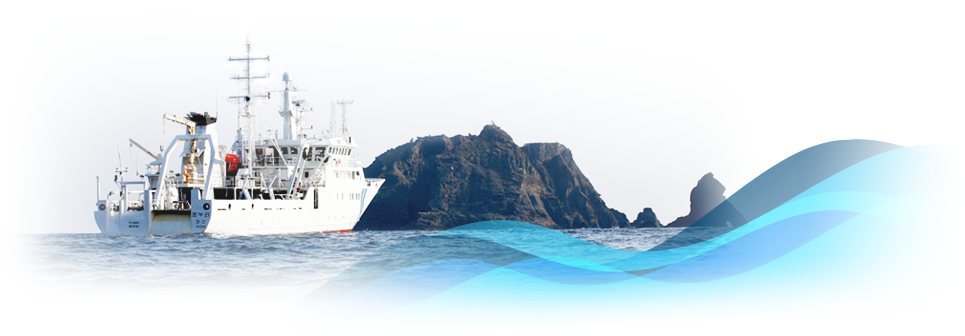
Furthermore, Dokdo Research Center relocated to the new premise at East Sea Research Institute of KIOST, Jukbyeon-myeon, Uljin-gun in Gyeongsangbuk-do, which is the point closest to Dokdo on the mainland, with view of the East Sea spanning with tangible proximity. With renewed resolve, Dokdo Research Center takes the steps for yet another leap to the next level with exciting prospects for new research on Dokdo and the East Sea.
Our sense of responsibility as the only statutory research center on Dokdo in the nation, we will be keenly alert to the public voice on Dokdo and pledge our continued commitment to the advancement and development of the Center as the nation’s outpost for oceanographic research on Dokdo through collaboration across industry, academia and research communities.
Park, Chan Hong, Director of Dokdo Research Center
Objectives
- Acquisition and analysis of marine information through oceanographic surveys on Dokdo
and the neighboring waters - Utilization for sustainable use and management of Dokdo, and for conservation
of ecosystem - Contribution to the establishment of national strategies and policies for Dokdo,
maritime delimitation, and territorial protection of Dokdo
Content
- Laying the foundation for interpretation the origin of Dokdo formation and future
utilization of the space by identifying the geomorphologic and structural
characteristics of Dokdo - Surveys of marine ecosystems such as distribution of marine life, species diversity, and habitat environment in neighboring waters of Dokdo
- Investigation and monitoring of environmental characteristics such as seawater circulation around Dokdo, seawater characteristics, and seawater pollution
- Construction and operation of Dokdo Information System
- Operation of Dokdo Research and diffusion of research outcomes and promotion
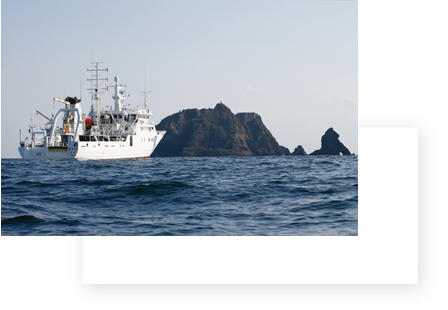
Methods
- According to the Master Plan for the Sustainable Use of Dokdo, Phase 1 and Phase 2 (2006 - 2015) have been completed. At present, Phase 3 of the 5-year plan (2016-2020) is being implemented
- Collaborative research across industry/academia/research communities centered on Dokdo Research Center, the statutory national research center on Dokdo, in KIOST East Sea Research Institute
- Conducting comprehensive oceanographic research in the neighboring waters of Dokdo
- Implementation of a comprehensive information system of Dokdo through a database composed of data acquired from scientific investigation
- Promotion of research achievements by holding academic conferences and exhibitions
Achievements
Research activities
- Comprehensive surveys of the neighboring waters of Dokdo
- Identification of new organisms and microbial strains and reports and presentations
at conferences - Analysis of seasonal trend in biodiversity and biomass
- Investigation of changes in the biomass of industrial species in and around Dokdo and
influencing factors of changes in the rocky shore ecosystem - Promotion of the official name of Dokdo through naming of Dokdo Abyssal Current
- Identification of characteristics of island effect and analysis on the causes of the effect
- Analysis of various chemical reactions of heavy metals and anthropogenic pollution in Dokdo’s seabed sediments
- Analysis of Dokdo submarine topology and tectonic structure
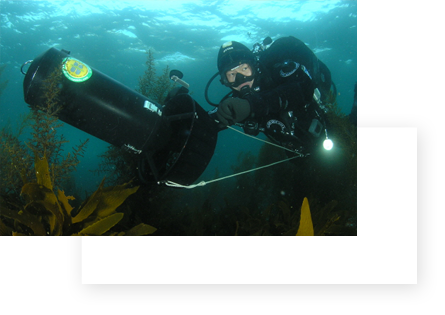
Major research outcomes
Publications and conference presentations
- Description of a novel genus Croceitalea in the family Flavobacteriaceae with two species, Croceitalea dokdonensis sp. nov. and Croceitalea eckloniae sp.nov., isolate from rhizosphere of marine alga 등
- A study on Dokdo and surrounding seamounts in the northeastern part of the Ulleung Basin of the East Sea using geophysical data: Implications for loading history of their seamounts 등
Diffusion of research achievements and promotional activities
- Acquisition of a large amount of new data with high precision on the marine territories around Dokdo and establishment and operation of the Dokdo DB
- Provision of important data for territorial management and sustainable use of Dokdo, supporting sovereignty of Korea over Dokdo
- Support for the establishment of major national and local policies on Dokdo
- A total of 2,880 cases of activities on promotion and diffusion of Dokdo research outcomes and achievements,
including the expanded reproduction of knowledge and information on Dokdo
- A total of 1,382 cases of press release and data provision (409 cases in 202) - KBS, MBC, YTN, etc.
- Construction of a 4D integrated simulator, Dokdo model fabrication, tour and visit to Dokdo Center and public information hall, etc.
- A total of 777 cases of public service on understanding and experiencing Dokdo” (16 cases in 2020)
- A total of 308 cases of academic papers and conference presentations (29 cases in 202) ? Diffusion of names 'East Sea' and 'Dokdo' in the international community
- Total number of published books: 35
- The representative titles include the following: 'Handbook for Fish Ecology in Dokdo with biological illustration', 'Dokdo Sea, the hidden numbers', 'Map of underwater ecology', 'Dokdo marine life based on biological illustration', ‘Series on Unravel the Secrets of Dokdo ' (1 case in 2020).
- A total of 11 domestic and international patents (1 case in 2020)
- A total of 22 cases of academic events such as workshops, seminars, and symposiums (25 cases in 2020)
- A total of 140 cases of dissemination of Dokdo knowledge/information through channels such as exhibitions and lectures (7 cases in 2020)
Construction of 3D video/images and 4D integrated simulator based on oceanographic data of Dokdo and distribution of materials to major institutions and elementary, middle and high schools nationwide
Development and operation of Dokdo Information System and construction of Dokdo GIS DB
Future Plans and Expectations
- Establishment of a comprehensive system for sustainable use and management of Dokdo according to the national Master Plan to establish national policy for use and management of Dokdo and improvement in the implementation
- Strengthening the territorial protection of Dokdo through publication and promotion of research outcomes at domestic and international conferences and events and gaining international recognition on the names of 'Dokdo' and 'East Sea', and notations of Dokdo-Ulleungdo's underwater geomorphologic features
- Effective responses to maritime territorial management, maritime delimitation, and Japan's claims of sovereignty over Dokdo to build public trust in Dokdo policy and to enhance capabilities of the state for resolving the Dokdo issue
- Preparation for sustainable spatial use of Dokdo through understanding structural characteristics of the seabed and coastal area of Dokdo and building relevant data
- Collection and acquisition of data for monitoring the environmental and ecological impacts on Dokdo before and after the use and development of Dokdo
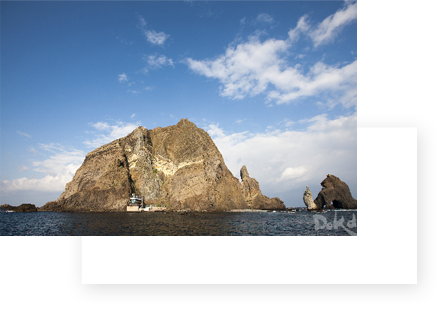
Future Challenges
- Comprehensive surveys and research on Dokdo to derive practical and visible results for contribution to territorial protection of Dokdo and in preparation for the sustainable use of territorial space in the future
- Transition to intensive surveys with expanded scope of surveys and consideration of seasonal variations for accurate understanding of ecological and environmental characteristics as well as resources and structure of waters of Dokdo and sustainable use and effective conservation and management of Dokdo
- Research linked with Ulleungdo to raise awareness of Dokdo's territorial attribution and conduct comparative studies
- Establishment of a comprehensive oceanographic monitoring system and real-time service to increase the utilization of marine and environmental data of Dokdo
- Establishment and utilization of comprehensive Dokdo experience facilities such as the Dokdo virtual reality system